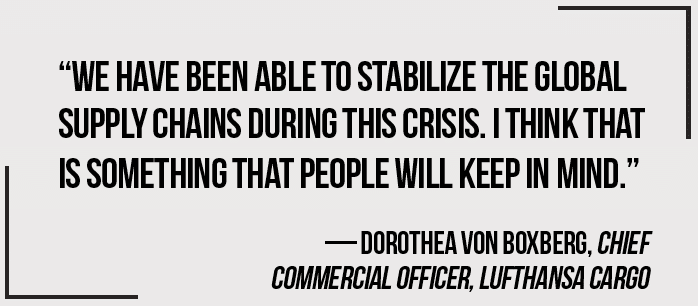Air cargo in the spotlight: Dorothea von Boxberg is an Executive to Watch in 2021
Despite the challenges of 2020 due to the COVID-19 pandemic, the year has proven the value of airfreight, supporting express deliveries of holiday gifts and just-in-time shipments to keep factory lines moving, and providing rapid transport of personal protective equipment (PPE) for health care workers caring for those affected by the virus. The past year has spotlighted the industry for outside observers, even as it has presented various operational challenges. Flights have been canceled, travel restrictions have been enforced around the world, and disruptions in other transport modes push demand toward air although capacity remains scarce on many trade lanes.
This year is coming to an end, but air cargo may face its greatest challenge yet in the months ahead. Billions of people are relying on the logistics industry to safely distribute doses of the vaccines now in their final stages of regulatory approval, and many doses will make at least part of the journey by airfreight. With so many of the specific transportation requirements still unknown, industry leaders are called to rise above any adversity in service to the great task of global vaccination.
In this year’s survey of Air Cargo World readers, respondents recognized the difficulties posed for global supply chains. Considering the many obstacles executives have risen above in 2020, and the task ahead in 2021, Air Cargo World has selected three air cargo executives who we expect to guide their companies through the challenges of 2021 and beyond.
In the first of three parts of this feature, Air Cargo World profiles Lufthansa Cargo’s Dorothea von Boxberg.
Dorothea von Boxberg: Lufthansa Cargo detours to reach destination

Toiling in the dark depths of the fuselage, often beneath well-heeled passengers, the logisticians at passenger airlines have long worn the trifling attitudes toward their business as badges of honor. Twice per year published passenger flight schedules would reveal a network of relatively fixed capacities with minor fluctuations in response to passenger load factors and equipment type. Taking swipes in jest is, after all, an acceptable tradeoff for stable capacity. Or at least it was. During the course of just a few days in mid-March, the COVID-19 pandemic prompted passenger airlines around the globe to reevaluate their schedules. On March 11, Lufthansa Group — Europe’s largest airline group — announced initial cancellations of 20,000 flights, representing a seat reduction of 95%.
With capacity as the main commodity traded by cargo carriers, and little visibility into when passenger travel would recover, one might think a similar shift in strategy would be required of Lufthansa Cargo. That was not the case. “The goals for 2020 were left just as we had made them in 2019,” said Dorothea von Boxberg, chief commercial officer of Lufthansa Cargo. “This was of course a bit strange, because we had so much less capacity,” she said.
Drawing on an academic background in civil engineering, it came naturally for von Boxberg to tell her team, “let’s take a little detour, but still get to the target.”
What was changing on almost a daily basis, however, were Lufthansa Cargo’s flight plans. As flight restrictions increased, continuing to serve major cargo markets in China at one point required technical stops in Novosibirsk or Incheon. Similarly, U.S.-bound flights were routed through Toronto. “To stabilize operations when things were really unstable around us, we needed to be more flexible than ever,” von Boxberg said.
Just as the people-centric face of aviation had taken cargo for granted, so too did cargo take the bellyhold as a given. Enter the “preighter.” For a brief period in the early spring when demand for personal PPE was at its height, Lufthansa Cargo briefly enlisted A330-300s from its passenger fleet to supplement capacity across its dedicated 777F and MD-11F freighter fleet. von Boxberg started with Lufthansa in 2007 as part of the group’s strategy department in a role that involved identifying and evaluating acquisition targets, and gave her insight into what makes an airline profitable. Though preighters were popular for a few weeks, operating A330s without passengers was never going to part of a profitable long-term strategy. Once inventories of bulky PPE were fortified, Lufthansa pulled the plug on passenger freighters. 
The next issue in cargo engineering was “how to get more capacity in the market without flying more metal around the globe,” said von Boxberg. For routes that saw flights scaled back, this involved utilizing each flight to the fullest. With lower availability on passenger flights, Lufthansa has drafted new protocols for baggage loading that aim to maximize space. As travel picks up, cargo also has a seat at the table for discussions involving equipment selection, said von Boxberg. “Suddenly cargo is not this teeny weeny little add-on, but it becomes something important in the group.” With Lufthansa Cargo in a position to pair cargo-friendly aircraft with some of the top trade lanes, load factors are currently at their “highest ever,” she said. Cargo load factors increased from an average of 62.5 percentage points in Q1, to 72.8 percentage points by the end of Q3, according to a traffic release from the group.
In the months ahead, air cargo is expected to play a highly visible role in closing the pandemic chapter of the COVID-19 outbreak. U.K. regulators approved the first COVID-19 vaccine for general use in early December, with other governments expected to soon follow. “I think there will be huge focus on the first shipments in the first half year 2021.” While ultra-low temperature requirements for vaccine transportation in the early days of vaccine transportation could pose challenges, von Boxberg expects capacity to be less of an issue. Although shipment frequency will be intensive, they won’t necessarily occupy capacity on entire aircraft. “It sounds very much like steady shipment flows,” she said.
While von Boxberg is rooting for the passenger airlines “to come back and take their share,” she doesn’t expect the prestige of air cargo’s heightened role this year to wear off anytime soon. “We have been able to stabilize the global supply chains during this crisis. I think that is something that people will keep in mind.”
Effective March 1, 2021, von Boxberg will take up the role of CEO at Lufthansa Cargo.




